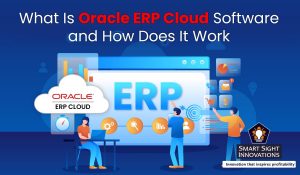 Oracle Enterprise Resource Planning Cloud is a software solution designed to manage an organization’s end-to-end operations, including supply chain management, project management, enterprise performance management, financial management, and more. It is also known as Cloud Enterprise Resource Planning (ERP) solution.
Oracle Enterprise Resource Planning Cloud is a software solution designed to manage an organization’s end-to-end operations, including supply chain management, project management, enterprise performance management, financial management, and more. It is also known as Cloud Enterprise Resource Planning (ERP) solution.
What is Oracle ERP
Oracle ERP system is all-inclusive software for managing business processes and functions, real-time reporting, business intelligence and decisions. ERP streamlines business operations, automates manual processes and reduces business costs.
Oracle ERP Cloud SaaS software provides advanced public cloud capabilities, including an advanced intelligent voice user interface (UI) and on-premises ERP software.
If you are looking forward to ERP tools now and in the future, such as AI and Machine Learning, Oracle’s ERP Cloud accomplishes all these and more. These solutions provide business leaders with a reliable source to run their companies efficiently and profitably.
Features of Oracle ERP
The features that provide advantages of Oracle Cloud lie with the software’s cloud platform and flawless delivery. ERP Cloud was designed for the cloud and is known for its super flexibility. The main features and their benefits include:
Scalability
One of the most notable benefits of an ERP cloud is its ability to grow with your business. Whether it looks like automated processes like inventory management or reducing costs through streamlining and lower total cost of ownership, the ERP cloud has the potential for any business to take advantage of the digital transformation path and better revenues.
No upgrade required
Due to its cloud nature, updates and new functionality are automatically delivered to your software. All you need is a safe and fast internet connection. It eliminates the potential cost of system upgrades, ensuring that your system is always up to date.
Low upfront cost
Selecting on-premises ERP software requires you to purchase the equipment needed to run your system, as well as the people needed to maintain it. With ERP Cloud, your subscription-based platform is run over the internet, reducing the initial cost required to implement your new solution.
Modern user experience
Now, ERP is widely accepted as a business tool, but it was not the case earlier. The acceptance has improved and businesses are still on their way to digital transformation. ERP Cloud includes mobile capabilities to keep employees engaged.
Agile, real-time analytics give you the ability to make informed decisions and personalize the experience for both employee and customer.
State-of-the-art security
Most business leaders now choose cloud-based ERP platforms for data protection. ERP Cloud as a solution with its automatic deployment of updates ensures that your system is always up-to-date with the latest in available security measures.
Additionally, there is an economic benefit as cloud data storage can be outsourced to a larger and more secure third party, eliminating the cost of hardware and its maintenance.
Third-party integration
ERP Cloud’s integrated software suite provides a comprehensive set of tools, but your business may need more to take full advantage of your ERP system. Existing third-party solutions are available for integration with your system.
Best-in-class business processes
Oracle ERP Cloud is a top ERP solution and has been recognized as an industry leader, with the highest efficiencies of execution. More than ever before, business leaders rely on the ERP cloud to simplify their IT systems and improve security and accelerate the addition of new features.
Which type of business uses Oracle ERP software?
Organizations in various industries use ERP software. These systems can be incorporated into almost any industry, but some industries see greater benefits with ERP, such as:
- Innovative companies seeking the latest technology applications that provide real-time business intelligence to drive decision-making and action, choose Oracle ERP on the cloud.
- Manufacturers using various production methods use Oracle Cloud ERP. The cloud solution works for discrete product creation, process creation, mixed-mode manufacturing, and project creation.
- Oracle Cloud ERP system generation 2 uses cloud technologies, including Internet of Things (IoT), computer vision, machine learning (ML/AI), and an intelligent voice digital assistant with sensors.
- Oracle Cloud ERP can provide warnings when a manufacturing defect or deviation from standards occurs early enough during manufacturing to take action.
- Global publicly held businesses, whose financial management needs to understand and communicate results, perform financial planning with multiple scenarios using this system.
- Manufacturing, distribution, professional services, construction, industrial services, healthcare, automotive parts, etc use ERP. Popular examples include Facebook, Cisco, LinkedIn and Motorola.
Core modules of Oracle ERP cloud
Oracle ERP Cloud comes with an integrated suite of applications ready to manage your business operations. Its major applications include:
Financial cloud
With this system, you can improve the financial management of your company with this complete solution. Efficient tools include cash management, general ledger, payables, receivables, taxes, advanced collections, and more.
Supply chain management cloud
You can oversee your company’s supply chain from end to end. In addition, improve visibility into inventory management, streamline your order management process and proactively resolve exceptions, reducing costs and increasing logistic efficiency.
Project management cloud
The collaboration follows this application. It works for industries such as business services, in which project-based work is prevalent, and project management is easy.
You can view real-time project status updates, measure performance with reporting to make better business decisions and match resources with open projects through greater transparency.
Risk management cloud
Many organizations experience some sort of fraud. With this module, companies can automate the access and separation of fee controls to prevent fraud. It helps reduce cash leakage, errors, and compliance violations by continuously monitoring your purchase-to-pay and expense controls.
It streamlines compliance processes while minimizing manual intervention with intelligent automatic conflict closure.
Oracle cloud support
Oracle Cloud’s software computing as a Service (SaaS) or Infrastructure as a Service (IaaS), encourages future migration due to cloud benefits. It continues to provide excellent support to companies ready to transit while delivering the benefits of Oracle E-Business Suite (EBS). There are different types of cloud computing as well. Oracle is encouraging the following moves:
- EBS application on Oracle IaaS
- Enhanced EBS applications with Oracle SaaS applications
- EBS application migration to Oracle SaaS Applications
Your company can smartly respond to acquisitions, disinvestments and globalization, and can manage regulatory changes and other challenges
Challenges handled by Oracle ERP cloud
- Reduce manual procedures by automating and streamlining manual processes wasting time and resources.
- Provide data accessibility, with quick and easy access to real-time data across an organization.
- Help data integrity by providing stakeholders with timely, accurate financial statements and inventory reports.
- Meeting expectations by order accuracy, on-time delivery, and cost savings.
- Balancing supply and demand by managing supply chains in the face of rapid change, rising costs and changing buyer behavior.
- Keep an inventory with planning, and balancing inventory to meet the demand.
When does your business need Oracle ERP?
Business development focuses on short-term goals and long-term growth and analyzes potential business challenges. Regular analysis of systems helps to identify when a business may need to integrate an ERP system. An ERP solution should be considered when the existing systems and processes are:
- No longer functioning or inefficiently functioning with impediments
- No longer supports the development of the company
- Lack of current safety requirements to reduce risk
To sum it up
Maybe you prefer the cloud due to its data security, constant delivery structure for platform updates, and lower upfront costs. Oracle enterprise resource planning cloud solution could be the answer to your company’s need for a smart, scalable business tool.
Oracle Cloud ERP is a complete suite that provides your teams with advanced capabilities, such as AI to automate slow manual processes, analytics to react to market changes in real-time, and auto-updates for competitive advantage.
Businesses implementing ERP get access to accurate analytics, a connection of multiple systems, increased business management, improved customer satisfaction, and reduced business costs.














